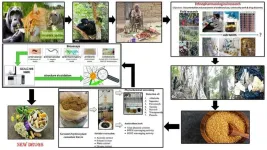(Press-News.org) Four plants consumed by wild gorillas in Gabon and used by local communities in traditional medicine show antibacterial and antioxidant properties, find Leresche Even Doneilly Oyaba Yinda from the Interdisciplinary Medical Research Center of Franceville in Gabon and colleagues in a new study publishing September 11 in the open-access journal PLOS ONE.
Wild great apes often consume medicinal plants that can treat their ailments. The same plants are often used by local people in traditional medicine.
To investigate, researchers observed the behavior of western lowland gorillas (Gorilla gorilla gorilla) in Moukalaba-Doudou National Park in Gabon and recorded the plants they ate. Next, they interviewed 27 people living in the nearby village of Doussala, including traditional healers and herbalists, about the plants that were used in local traditional medicine. The team identified four native plant species that are both consumed by gorillas and used in traditional medicine: the fromager tree (Ceiba pentandra), giant yellow mulberry (Myrianthus arboreus), African teak (Milicia excelsa) and fig trees (Ficus). They tested bark samples of each plant for antibacterial and antioxidant properties and investigated their chemical composition.
The researchers found that the bark of all four plants had antibacterial activity against at least one multidrug-resistant strain of the bacterium Escherichia coli. The fromager tree showed “remarkable activity” against all tested E.coli strains. All four plants contained compounds that have medicinal effects, including phenols, alkaloids, flavonoids, and proanthocyanidins. However, it’s not clear if gorillas consume these plants for medicinal or other reasons.
Biodiverse regions, such as central Africa, are home to a huge reservoir of unexplored and potentially medicinal plants. This research provides preliminary insights about plants with antibacterial and antimicrobial properties, and the four plants investigated in this study might be promising targets for further drug discovery research — particularly with the aim of treating multidrug-resistant bacterial infections.
The authors add: “Alternative medicines and therapies offer definite hope for the resolution of many present and future public health problems. Zoopharmacognosy is one of these new approaches, aimed at discovering new drugs.”
#####
In your coverage please use this URL to provide access to the freely available article in PLOS ONE: https://journals.plos.org/plosone/article?id=10.1371/journal.pone.0306957
Citation: Yinda LEDO, Onanga R, Obiang CS, Begouabe H, Akomo-Okoue EF, Obame-Nkoghe J, et al. (2024) Antibacterial and antioxidant activities of plants consumed by western lowland gorilla (Gorilla gorilla gorilla) in Gabon. PLoS ONE 19(9): e0306957. https://doi.org/10.1371/journal.pone.0306957
Author Countries: Gabon, UK, France
Funding: The authors received no specific funding for this work.
END
Self-medicating gorillas and traditional healers provide clues for new drug discovery
Four plants eaten by gorillas, also used in Gabonese traditional medicine, have antibacterial effects
2024-09-11
ELSE PRESS RELEASES FROM THIS DATE:
Trust in police declined among Black Chicago residents after Jacob Blake shooting
2024-09-11
Survey data collected from Chicago, Illinois at the time of the 2020 police shooting of Jacob Blake in nearby Wisconsin shows that trust in police plummeted among Black residents after the shooting. Jonathan Ben-Menachem and Gerard Torrats-Espinosa of Columbia University in New York, U.S., present these findings in the open-access journal PLOS ONE on September 11, 2024.
For young minority men in the U.S., police violence has become a leading cause of death. Prior research has explored how police violence and misconduct might reduce trust in police, but most studies have been limited in ...
Quitting smoking reduces risk of atrial fibrillation
2024-09-11
Quitting cigarettes can significantly lower a person’s risk of atrial fibrillation (AFib) compared to those who continue to smoke, according to a study published today in JACC: Clinical Electrophysiology. The findings show that the benefits of quitting start right away, suggesting that it is possible to reverse the risk of negative health outcomes.
“The findings provide a compelling new reason to show current smokers that it’s not too late to quit and that having smoked in the past doesn’t ...
How many people have A-Fib? Three times more than we thought
2024-09-11
Atrial fibrillation, a rapid, irregular heart beat that can lead to stroke or sudden death, is three times more common than previously thought, affecting nearly 5% of the population, or 10.5 million U.S. adults, according to new estimates from UC San Francisco.
A-Fib, as the condition is commonly known, has been on the rise for at least the past decade, driven by the aging of the population, along with increasing rates of hypertension, diabetes and obesity. Earlier projections had estimated that 3.3 million U.S. adults ...
Groundbreaking achievement: NSF Daniel K. Inouye solar telescope produces its first magnetic field maps of the sun’s corona
2024-09-11
Summary: The U.S. National Science Foundation (NSF) Daniel K. Inouye Solar Telescope, the world’s most powerful solar telescope, operated by the NSF National Solar Observatory (NSO), achieved a major breakthrough in solar physics by successfully producing its first detailed maps of the Sun’s coronal magnetic fields. This milestone, led by NSO Associate Astronomer Dr. Tom Schad, was recently published in Science Advances, and promises to enhance our understanding of the Sun's atmosphere and how its changing conditions lead to impacts on Earth's technology-dependent society. The corona, or the Sun’s ...
Landmark study reveals how antibiotics contribute to inflammatory bowel disease risk
2024-09-11
In a landmark study published today in Science Advances, Dr. Shai Bel and his research team at the Azrieli Faculty of Medicine of Bar-Ilan University have uncovered crucial insights into how antibiotic use increases the risk of inflammatory bowel disease (IBD).
The study demonstrates that antibiotics interfere with the protective mucus layer in the intestine, a discovery that could reshape our understanding of antibiotic effects and IBD development.
IBD, which includes Crohn’s disease and ulcerative colitis, affects approximately 1% of the global population. This debilitating condition is ...
Neuromorphic platform presents huge leap forward in computing efficiency
2024-09-11
In a landmark advancement, researchers at the Indian Institute of Science (IISc) have developed a brain-inspired analog computing platform capable of storing and processing data in an astonishing 16,500 conductance states within a molecular film. Published today in the journal Nature, this breakthrough represents a huge step forward over traditional digital computers in which data storage and processing are limited to just two states.
Such a platform could potentially bring complex AI tasks, like training Large Language Models (LLMs), to ...
Genetics of dementia in African and underrepresented populations presented
2024-09-11
Regions of the genome associated with Alzheimer’s disease and dementia in African populations will be presented at the Future of Dementia in Africa conference on September 11-12, 2024. The studies highlight discrepancies compared to Caucasian populations and underscore that a lack of diversity in genomic studies potentially limits the effectiveness of targeted therapies across diverse populations.
The Future of Dementia in Africa conference will take place at the J.W. Marriott Hotel in Nairobi, Kenya. It is a Nature Conference, ...
Turning seawater into fresh water through solar power
2024-09-11
Researchers at the University of Waterloo have designed an energy-efficient device that produces drinking water from seawater using an evaporation process driven largely by the sun.
Desalination is critical for many coastal and island nations to provide access to fresh water, given water scarcity concerns due to rapid population growth and increasing global water consumption. Roughly 2.2 billion people worldwide have no access to clean water, emphasizing the urgent need for new technologies to generate fresh water, according to the UN World Water Development Report 2024.
Current desalination systems pump seawater through membranes to ...
How the oceans’ most abundant bacteria impact global nutrient flows
2024-09-11
If you were to collect all the organisms from the ocean surface down to 200 meters, you’d find that SAR11 bacteria, though invisible to the naked eye, would make up a fifth of the total biomass. These bacteria, also known as Pelagibacterales, have evolved to thrive in nutrient-poor marine environments and play a significant role in global nutrient cycles. Despite their importance, the mechanisms behind their impact on the planetary ecosystem have remained unclear.
But now, a recent Nature paper by researchers from the Okinawa ...
Discovery of a new phase of matter in 2D which defies normal statistical mechanics
2024-09-11
Physicists from the Cavendish Laboratory in Cambridge have created the first two-dimensional version of the Bose glass, a novel phase of matter that challenges statistical mechanics. The details of the study have been published in Nature.
As the name suggests, the Bose glass has some glassy properties and within it all particles are localised. This means that each particle in the system sticks to itself, not mixing with its neighbours. If coffee was localised, then when stirring milk into the coffee, the intricate pattern of black and white stripes would remain forever, instead of washing out to an average.
To create this new phase of matter, the group overlapped several laser ...
LAST 30 PRESS RELEASES:
Maps can encourage home radon testing in the right settings
Exploring the link between hearing loss and cognitive decline
Machine learning tool can predict serious transplant complications months earlier
Prevalence of over-the-counter and prescription medication use in the US
US child mental health care need, unmet needs, and difficulty accessing services
Incidental rotator cuff abnormalities on magnetic resonance imaging
Sensing local fibers in pancreatic tumors, cancer cells ‘choose’ to either grow or tolerate treatment
Barriers to mental health care leave many children behind, new data cautions
Cancer and inflammation: immunologic interplay, translational advances, and clinical strategies
Bioactive polyphenolic compounds and in vitro anti-degenerative property-based pharmacological propensities of some promising germplasms of Amaranthus hypochondriacus L.
AI-powered companionship: PolyU interfaculty scholar harnesses music and empathetic speech in robots to combat loneliness
Antarctica sits above Earth’s strongest “gravity hole.” Now we know how it got that way
Haircare products made with botanicals protects strands, adds shine
Enhanced pulmonary nodule detection and classification using artificial intelligence on LIDC-IDRI data
Using NBA, study finds that pay differences among top performers can erode cooperation
Korea University, Stanford University, and IESGA launch Water Sustainability Index to combat ESG greenwashing
Molecular glue discovery: large scale instead of lucky strike
Insulin resistance predictor highlights cancer connection
Explaining next-generation solar cells
Slippery ions create a smoother path to blue energy
Magnetic resonance imaging opens the door to better treatments for underdiagnosed atypical Parkinsonisms
National poll finds gaps in community preparedness for teen cardiac emergencies
One strategy to block both drug-resistant bacteria and influenza: new broad-spectrum infection prevention approach validated
Survey: 3 in 4 skip physical therapy homework, stunting progress
College students who spend hours on social media are more likely to be lonely – national US study
Evidence behind intermittent fasting for weight loss fails to match hype
How AI tools like DeepSeek are transforming emotional and mental health care of Chinese youth
Study finds link between sugary drinks and anxiety in young people
Scientists show how to predict world’s deadly scorpion hotspots
ASU researchers to lead AAAS panel on water insecurity in the United States
[Press-News.org] Self-medicating gorillas and traditional healers provide clues for new drug discoveryFour plants eaten by gorillas, also used in Gabonese traditional medicine, have antibacterial effects










